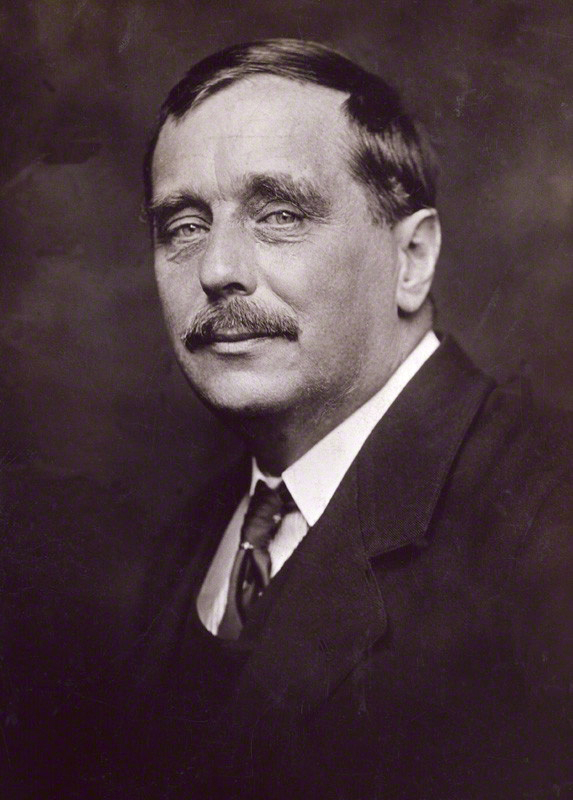“He lived in the future at the same time as the past,” declares author Sarah Cole of H. G. Wells. Thus it is not surprising to see him write in 1923 that the possibility of pandemic always lingers as a potential cause of humanity’s swift future extermination. While the coronavirus may not pose such an existential threat to humanity, who is to say where and when a far more deadly contagion may arise?
Even those least acquainted with the vast output of Wells (he wrote 100 books, and much else) will know him as the author of War of the Worlds, the story of a Martian invasion. The famous actor Orson Welles made it notorious with his radio broadcast of 1938 that had many people in the eastern United States believe it was real. But the point of the story was that Earth was saved not by nuclear bombs dropped on the alien spacecraft, but by bacteria: Martians had no immunity to pathogens born of this world. So for H.G. Wells the tiny agents of destruction can work both ways: to destroy or save humanity.
Sarah Cole is Professor of English and Comparative Literature, and dean of humanities, at Columbia University. Her task here was a rescue mission. Modernist literary studies, which have been the hallmark of academic analysis since the 1960s, have virtually dismissed the relevance, substance and importance of Wells. Cole deserves a lifeguard award for resuscitating not only his reputation but his relevance to the 21st century.
Wells had a life of 80 years (1866-1946) in which he became a cultural icon unmatched by anyone else. His hallmark, states the author, was “the restlessness of his imagination adjusting itself to new ideas and technologies and bending those ideas and technologies to his own powerful determinants.” His writing, Cole discerns, “is replete with attempts to think outward from the individual to the species, or from the present to the far past and future, or from the local to the planetary.”
Times far distant were the subject of his great classic The Time Machine. Who else in 1895 could have imagined writing about what Earth would be like in the year 802,701? In this novel too he faces the prospect of the extinction of all life on our planet. He looked to the past with an equaling discerning gaze, in a tale published just two years later entitled A Story of the Stone Age (1897).
The famed novelist Joseph Conrad called Wells “The realist of the fantastic.” Cole finds that “with alarming regularity, Wells erases the line separating metaphor from the actual, and these transgressions play out largely as nightmare or as the overturning of the world order.” She lists The Time Machine as one of these texts, which “makes literal the nineteenth-century trope of intractable, binary class division.”
He was so prolific that Cole warns us not to judge him by just one or two of his books. “Well’s works cannot best be read singly. His works do not operate as perfect wholes, and his genius is rarely expressed at the level of the line or the paragraph. And now the difficult part: to recognize that this is not a failing. It is a signature, a way of entering Well’s vast and living textural world.”
Thus it is not surprising that modern readers, including those who assume the mantle of scholarship, have neglected Wells. The effort is just too great, but in this book we can grasp the essence of what he was and what he meant to so many people, including Winston Churchill. Cole puts it best when she states that Wells “is hyper present.”
While it lacks any illustrations, the book has a fine Index. Even though it is not inclusive (it fails to mention the British Empire, which features several times in the book) it does include names, places and concepts. The prose would also have benefited by shorter sentences: I found 125 words in a single sentence, which is probably not the most verbose in the book.
With much to say about such vastly different mediums as his 1936 movie Things to Come (the best film of all time) and the 1896 book The Island of Doctor Moreau, Cole paints a canvas so vast that second reading of this important book is called for. With most of his books out of print, it is not surprising the majority of his output is hardly read. But as a futurist in the best construction of that term, we need him now more than ever. “Wells is, by his own admission, simply more interested in tomorrow than he is in today.” His tomorrow is still our tomorrow.
Inventing Tomorrow: H.G. Wells and the Twentieth Century is $35 from Columbia University Press.
Photo: Wells as he appeared in 1920













